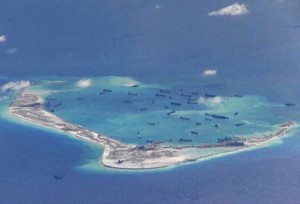BEIJING: China has expanded its presence in the contested West Philippine Sea (South China Sea) by switching on a lighthouse atop a reconstructed reef also claimed by Vietnam and the Philippines, state media said.
The 55-meter-high facility on Subi Reef in the Spratly chain contains technology to monitor passing ships, the official Xinhua news agency reported late Tuesday.
China claims virtually all of the South China Sea despite conflicting claims by Brunei Darussalam, Malaysia, Vietnam, Taiwan and the Philippines.
It constructed artificial islands in the area in recent months as it asserts its claims.
China has turned Subi Reef—known as Zhubi in China—into an artificial island in the past year, satellite photos have shown, reclaiming nearly 400 hectares of land.
The island-building has been condemned by neighbors and the United States but Beijing insists it is aimed at helping with maritime search and rescue.
Chinese transport officials held a ceremony on Subi also on Tuesday, Xinhua said.
Pictures showed men in white shirts beside the towering structure next to a sign reading “Lights-on ceremony.”
Washington regularly accuses Beijing—which says it has built runways and deployed unspecified weapons to the islands—of militarizing the area.
Beijing denies the accusations and says US patrols have ramped up tensions.
Citing an obligation to uphold freedom of navigation, Washington last year sent the USS Lassen to sail past Subi Reef, a move that angered Beijing.
Xinhua reported last year that China will build two 50-meter-tall lighthouses on the Cuarteron and Johnson South reefs in the Spratly islands, which are also claimed by Vietnam and the Philippines.
The state-run China Daily newspaper reported in 2014 that Beijing will build five new lighthouses in the South China Sea’s Paracels chain.
On Wednesday, the Philippines called on members of the Association of Southeast Asian Nations (Asean) to work together to ensure a peaceful maritime environment amid China’s unilateral activities in the West Philippine Sea.
Speaking at the 8th Asean Regional Forum Inter-Sessional Meeting on Maritime Security in Makati City (Metro Manila) on Tuesday, Foreign Undersecretary Enrique Manalo urged Asean members to take a lead role in securing the enforcement of maritime laws.
Asean officials discussed challenges, relevant best practices, legal frameworks and regional arrangements to deepen cooperation between member countries.
Manalo noted that the meeting’s agenda is critical to the Philippines as it continues to assert its claims on the disputed sea.
“As an archipelagic state, the Philippines is firmly committed to building a rules-based maritime security architecture,” Manalo said, adding that the country had actively engaged in implementing the provisions of the Declaration on the Conduct of Parties in South China Sea and in facilitating discussions on an effective Code of Conduct in the territory.
He further noted that a significant portion of the Philippine economy is dependent on the sea, thus it is essential for the country to preserve the peaceful maritime environment, implement responsible and sustainable fishery policies and combat illegal, unregulated and unreported fishing activities.
The Philippines, Manalo said, has a significant interest in ensuring safety of navigation to protect about 400,000 Filipino seafarers.
“This involves ensuring the ships are seaworthy, that operating procedures on ships are compliant with international safety standards and vessels are protected against piracy and armed robbery, and that the appropriate protocols are in place to avoid collisions and other accidents at sea,” he added.
The meeting brought together 103 officials from Asean member states, Australia, Canada, China, European Union, India, Japan, New Zealand, Pakistan, South Korea, Russia, Sri Lanka, Timor Leste and the US.
The Asean Regional Forum is the foremost multilateral forum of the 27 member states for official consultations on peace and security issues in the Asia-Pacific region.
AFP AND MICHAEL JOE T. DELIZO


